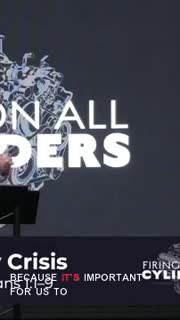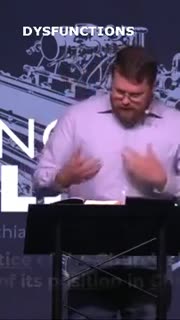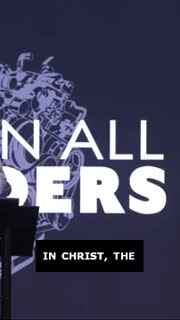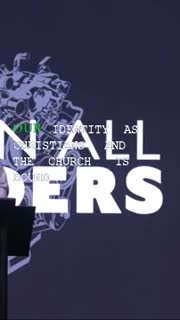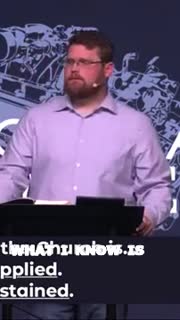Embracing Our Identity: Firing on All Cylinders
Summary
### Summary
Imagine you're on a long-awaited family vacation, only to find yourself stranded on the side of the highway with a broken-down car. This scenario mirrors the experience of many with the church today—full of high hopes but often met with disappointment and dysfunction. As we embark on our new series, "Firing on All Cylinders," we delve into the book of 1 Corinthians, where Paul addresses a church fraught with issues like idolatry, division, and doctrinal confusion. Much like a car that’s falling apart, the Corinthian church was struggling to function as intended.
Paul begins his letter not by addressing the problems directly but by reminding the Corinthians of their identity in Christ. He emphasizes that the practice of the church should flow from its position in Christ. This foundational truth is crucial because it shifts the focus from merely fixing problems to understanding who we are in Christ. Paul highlights three key aspects of this identity: being set apart, being supplied with every gift, and being sustained by God.
Firstly, in Christ, the church is set apart. Paul refers to the Corinthians as sanctified and called to be saints, emphasizing that their identity has fundamentally changed. They are no longer of the world but belong to God. This new identity calls for a different way of living, one that reflects their sanctification.
Secondly, in Christ, the church is supplied with every gift needed to fulfill its calling. Paul assures the Corinthians that they are enriched in every way, lacking no spiritual gift. This enrichment is not for individual glory but for the collective benefit of the church community. The richness of God's grace is experienced within the community, emphasizing the importance of unity and interdependence among believers.
Lastly, in Christ, the church will be sustained. Paul reassures the Corinthians that God will sustain them to the end, presenting them guiltless on the day of our Lord Jesus Christ. This promise of sustenance is not based on their faithfulness but on God's unwavering faithfulness. It provides hope and confidence that despite their struggles, God will see them through to the end.
As we journey through this series, our goal is to examine our own church and lives, ensuring that we are firing on all cylinders by living out our true identity in Christ.
### Key Takeaways
1. Identity in Christ: Our identity as a church and as individual believers is rooted in Christ. We are set apart, sanctified, and called to be saints. This new identity changes our relationship with the world and calls us to live differently. Understanding this is crucial before addressing any practical issues. [06:31]
2. Community and Gifts: The richness of God's grace is experienced within the community of believers. We are supplied with every spiritual gift needed to fulfill our calling, but these gifts are meant to be used collectively. Unity and interdependence are essential for the church to function as intended. [18:28]
3. God’s Sustenance: Our confidence and hope lie in God's faithfulness, not our own. God promises to sustain us to the end, presenting us guiltless on the day of our Lord Jesus Christ. This assurance helps us navigate our struggles and remain steadfast in our faith. [23:05]
4. Practical Flow from Position: The practice of the church should flow from its position in Christ. Often, we focus too much on practical steps without understanding our foundational identity. Paul emphasizes that our actions should be a natural outflow of who we are in Christ. [07:16]
5. No Solo Christianity: Christianity is not a solo endeavor. The richness of God's grace and the effectiveness of our spiritual gifts are fully realized in community. Isolation cuts us off from the support and enrichment that come from being part of the body of Christ. [20:06]
### YouTube Chapters
[0:00] - Welcome
[00:41] - Road Trip Analogy
[01:36] - Introduction to 1 Corinthians
[02:30] - Church Struggles and Disappointments
[03:27] - YouTube University Analogy
[04:33] - Corinth's Cultural Context
[05:38] - Conflict and Compromise Issues
[06:31] - Spiritual Identity Crisis
[07:16] - Practice Flows from Position
[08:29] - Reading 1 Corinthians 1:1-9
[09:23] - Prayer
[10:07] - Grace of God in the Church
[11:32] - Centrality of Christ
[12:16] - Set Apart in Christ
[13:03] - God's Church
[14:22] - Consecrated by Christ
[15:36] - Gap Between Position and Practice
[17:21] - Supplied with Every Gift
[18:28] - Community and Gifts
[20:06] - Importance of Small Groups
[21:40] - Unity in the Church
[22:25] - Sustained in Christ
[23:05] - Faithfulness of God
[24:30] - Assurance in Christ
[26:01] - Presented in Splendor
[27:23] - Addressing Church Issues
[28:23] - Broader Understanding of the Church
[29:32] - Conclusion
Study Guide
### Bible Study Discussion Guide
#### Bible Reading
1 Corinthians 1:1-9 (ESV)
> "Paul, called by the will of God to be an apostle of Christ Jesus, and our brother Sosthenes, To the church of God that is in Corinth, to those sanctified in Christ Jesus, called to be saints together with all those who in every place call upon the name of our Lord Jesus Christ, both their Lord and ours: Grace to you and peace from God our Father and the Lord Jesus Christ. I give thanks to my God always for you because of the grace of God that was given you in Christ Jesus, that in every way you were enriched in him in all speech and all knowledge— even as the testimony about Christ was confirmed among you— so that you are not lacking in any gift, as you wait for the revealing of our Lord Jesus Christ, who will sustain you to the end, guiltless in the day of our Lord Jesus Christ. God is faithful, by whom you were called into the fellowship of his Son, Jesus Christ our Lord."
#### Observation Questions
1. What are the three key aspects of the church's identity in Christ that Paul emphasizes in 1 Corinthians 1:1-9? ([06:31])
2. How does Paul describe the church in Corinth in terms of their spiritual gifts? ([17:21])
3. What assurance does Paul give the Corinthians about their future in Christ? ([23:05])
4. According to the sermon, what is the significance of the phrase "the practice of the church should flow from its position in Christ"? ([07:16])
#### Interpretation Questions
1. Why does Paul start his letter by focusing on the Corinthians' identity in Christ rather than their problems? How does this approach help in addressing church issues? ([06:31])
2. How does understanding that the church is "set apart" in Christ change the way believers should live and interact with the world? ([12:16])
3. What does it mean for the church to be "supplied with every gift"? How should this affect the way we view our individual and collective roles in the church? ([17:21])
4. How does the promise of God's sustenance to the end provide hope and confidence for believers facing struggles? ([23:05])
#### Application Questions
1. Reflect on your own identity in Christ. How does knowing you are "set apart" influence your daily decisions and interactions? ([12:16])
2. In what ways can you contribute to the unity and interdependence of your church community, using the spiritual gifts you have been given? ([18:28])
3. Think about a time when you felt like you were "stranded on the side of the highway" in your faith journey. How did you experience God's sustenance during that time? ([23:05])
4. How can you ensure that your actions and practices as a believer flow naturally from your identity in Christ, rather than just following a set of rules? ([07:16])
5. Are you currently trying to live out your faith in isolation? What steps can you take to engage more deeply with your church community and experience the richness of God's grace? ([20:06])
6. How can you remind yourself and others of God's faithfulness when facing challenges and doubts about your faith? ([23:05])
7. Identify one area in your church or personal life that is not "firing on all cylinders." What practical steps can you take to address this, starting from your identity in Christ? ([28:23])
Devotional
### 5-Day Devotional
#### Day 1: Our Identity in Christ
Description:
Understanding our identity in Christ is foundational to our faith and practice. In 1 Corinthians, Paul begins by reminding the Corinthians of their sanctified status and calling as saints. This identity is not something we earn but is given to us through Christ. It changes our relationship with the world and calls us to live in a way that reflects our sanctification. Before addressing any practical issues, it is crucial to grasp this truth: our actions should flow naturally from who we are in Christ. This understanding helps us navigate life's challenges with a sense of purpose and direction. [06:31]
Bible Passage:
"But you are a chosen race, a royal priesthood, a holy nation, a people for his own possession, that you may proclaim the excellencies of him who called you out of darkness into his marvelous light." (1 Peter 2:9, ESV)
Reflection:
How does knowing that you are set apart and sanctified in Christ change the way you view your daily interactions and decisions? Can you identify one area in your life where you need to live more fully into this identity today?
#### Day 2: The Richness of Community and Gifts
Description:
The church is enriched with every spiritual gift needed to fulfill its calling. Paul assures the Corinthians that they lack no spiritual gift, emphasizing that these gifts are for the collective benefit of the church community. The richness of God's grace is experienced within the community, highlighting the importance of unity and interdependence among believers. This collective enrichment is not for individual glory but for the edification of the entire body of Christ. Unity and interdependence are essential for the church to function as intended, and this is where the true richness of God's grace is fully realized. [18:28]
Bible Passage:
"To each is given the manifestation of the Spirit for the common good. For just as the body is one and has many members, and all the members of the body, though many, are one body, so it is with Christ." (1 Corinthians 12:7, 12, ESV)
Reflection:
Think about the spiritual gifts you have been given. How can you use these gifts to serve and build up your church community this week? What steps can you take to foster greater unity and interdependence among your fellow believers?
#### Day 3: Confidence in God’s Sustenance
Description:
Our confidence and hope lie in God's faithfulness, not our own. Paul reassures the Corinthians that God will sustain them to the end, presenting them guiltless on the day of our Lord Jesus Christ. This promise of sustenance is based on God's unwavering faithfulness, providing hope and confidence that despite our struggles, God will see us through to the end. This assurance helps us navigate our challenges and remain steadfast in our faith, knowing that it is God who sustains us and not our own efforts. [23:05]
Bible Passage:
"He who calls you is faithful; he will surely do it." (1 Thessalonians 5:24, ESV)
Reflection:
In what areas of your life do you find it difficult to trust in God's faithfulness? How can you remind yourself of God's promises and faithfulness in those areas today?
#### Day 4: Practice Flows from Position
Description:
The practice of the church should flow from its position in Christ. Often, we focus too much on practical steps without understanding our foundational identity. Paul emphasizes that our actions should be a natural outflow of who we are in Christ. This means that our daily practices, decisions, and behaviors should be rooted in our understanding of our identity in Christ. When we grasp this foundational truth, our actions will naturally align with our calling and purpose in Him. [07:16]
Bible Passage:
"Therefore, as you received Christ Jesus the Lord, so walk in him, rooted and built up in him and established in the faith, just as you were taught, abounding in thanksgiving." (Colossians 2:6-7, ESV)
Reflection:
Reflect on your daily routines and practices. Are they aligned with your identity in Christ? What changes can you make to ensure that your actions are a natural outflow of who you are in Him?
#### Day 5: The Necessity of Community
Description:
Christianity is not a solo endeavor. The richness of God's grace and the effectiveness of our spiritual gifts are fully realized in community. Isolation cuts us off from the support and enrichment that come from being part of the body of Christ. Paul emphasizes the importance of small groups and unity within the church, as these are essential for spiritual growth and the proper functioning of the church. Being part of a community allows us to experience God's grace more fully and to use our gifts for the collective benefit of the church. [20:06]
Bible Passage:
"And let us consider how to stir up one another to love and good works, not neglecting to meet together, as is the habit of some, but encouraging one another, and all the more as you see the Day drawing near." (Hebrews 10:24-25, ESV)
Reflection:
Are you actively participating in a church community or small group? If not, what steps can you take to become more involved? How can you encourage and support others in your community this week?
Quotes
1. "And the sad reality is that for many people today, our experience with church is a little bit more like that car breaking down the side of the highway. We've got great plans. We'd love for it to go well. We're looking forward to this awesome experience. And then things just don't go out the way we thought they would. And we feel maybe a little discouraged, maybe disconnected with the church, maybe for some people downright disappointed with their experience in it." [02:30] (26 seconds)
2. "Because it's important for us to understand that the practice of the church ought to flow out of its position in Christ. The practice of the church ought to flow out of its position in Christ. A lot of times, we don't know. A lot of times, we try to flip that. We become so focused on the practice, practice, practice. We love practical. Tell me what to do. I'm going to go do it. Give me my three steps, et cetera, and we'll go on our way, and we all will be happy. And Paul's like, that's great. We got a lot to deal with. But first, we got to go back to who we are." [07:16] (34 seconds)
3. "Despite all the dysfunctions that Paul is going to address throughout this letter, he starts by addressing the struggling church by bringing their attention back to the grace of God that's been given to them. And now this is profound. Because as I look at this church, and you think of the struggles that they were dealing with. It's hard at times to think of how could you find something to be so thankful for with them. There's a lot of mess. There's a lot of dirt. There's a lot of things to clean up. And Paul starts things off by saying, I'm thankful. I'm thankful for you. Not because just something they're doing. But because of the grace of God that's been given to them." [10:07] (40 seconds)
4. "In Christ, the church is set apart. In verse two, he addresses this church as the church of God that's in Corinth. And before we just skim over that, it's a profound statement because it defines, who they are and their relationship in some ways to the world. They are God's people. They no longer belong to the course of this world. They are God's church. So as we address our church today, this is not Tim Badal's church. And I don't just say that because he's not here preaching. If he were the one standing here right now, he would be the first person to tell you that this is not his church." [13:03] (38 seconds)
5. "In Christ, we have been supplied with every gift that we need. In Christ, we are rich in God's grace. Do you believe that? You believe we are rich in God's grace. Now, it's a beautiful thing because from there he goes down to verse seven and says that being enriched in his grace so that you're not lacking any gift. God did not say, hey, good luck figuring it out. He said, here's a high calling as saints. Here's the tools, the resources, the power, the strength, all that you need. All that you need to live into that calling. But it doesn't come from you. It's not your own wisdom. It's not your own power. It's not your own wherewithal. That comes by the grace of God that has been given to us in the church." [17:21] (45 seconds)
6. "Our identity as Christians and the church is bound up in the community of believers in Christ. In Christ we've been set apart. In Christ. We have been supplied. And the good news as we continue to move forward is that in Christ we will be sustained. We will be sustained. As you move down to the end of verse 7, you're not lacking any gift as you wait for the revealing of our Lord Jesus Christ who will sustain you to the end, guiltless in the day of our Lord Jesus Christ." [22:25] (36 seconds)
7. "What I know is that my experience, is that my faith breaks down more often than I'd like to admit. I struggle and try to find my way, fall to temptations, struggle to see God's perspective in things, and I'm thankful that my hope and my confidence does not rest entirely on my faithfulness. And I'm gonna bet that many of us have a similar sentiment. I just know that the scriptures say that I'm incapable with you. And in my own being to obtain my salvation, I can't save myself from my sins. I can't go and do enough good things to just try to tip the scales. That's not how this works. I can't get into God's kingdom on my own." [23:05] (55 seconds)
8. "If there's one place you're gonna find a little bit of hope, it should be in the words of our savior saying, if I've given them eternal life, they're not gonna perish. But the reality is I know that many in this room today are feeling like you are on the brink of perishing. You're like, if one more thing goes wrong, if the bears lose today, I think I might perish. But in Christ, you will be sustained. Beginning of verse nine, he says, listen, God's faithful. Where do you place that hope? Many of us say, I need Christ to get in and then I need myself to get through. And Paul's saying, no. It's God's faithfulness. He's the one who has saved you from your sins. He has given you eternal life. And Jesus says, none of them are gonna perish." [24:30] (58 seconds)
9. "So when you're limping through today, and I know some of us are, or this week, or this season in life, we rest our confidence, not again on our faithfulness, but on the faithfulness of our God. He says he's gonna get you through. It's his strength. So if we're going to address the, areas of the life in the church where we are not firing on all cylinders, we have to fight the temptation to do so under our own strength. There is a reason, Paul does not just mince words here, that at the outset of this, this is what he talks about. This is where he starts with the Corinthian church, because when you want to fix divisions, we'll just go find something to agree on. Is that the answer? No. The answer is don't forget your identity of who you are in Christ." [27:23] (48 seconds)
10. "As we work through this letter, who are we in Christ? And for many of us, we have a faulty view of the church. We simply view the church far too small. We think of it as an organization, we think of it as a place, we think of it as something that we do. I was talking with my wife, Bree, this week, and I was like, I'm looking forward to this study, because I think if we're willing to open our hearts and open our minds to what Paul is really going to address throughout this year, we're going to step back and see that he is going to broaden much of our understanding of the role, the function, the identity, the nature of the church." [28:23] (37 seconds)

